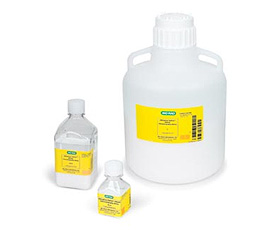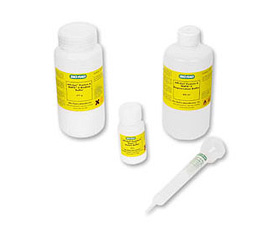We offer both research-scale and process-scale Protein A beads with a choice of matrix: either protein A agarose or a macroporous cross-linked matrix with epoxide-linked protein A. All our protein A resins are resistant to denaturants and stable at both high and low pH.
Protein A Columns and Media
Protein A is a cell-wall protein of Staphylococcus aureus that can bind immunoglobulins from many species. The bacterium uses protein A as part of its defense against a host immune system. Recombinant protein A is produced in E. coli for research use and the manufacture of affinity chromatography media.
Protein A columns are used for the purification of antibodies from complex mixtures such as serum, ascites, and hybridoma culture media. Several protein A column and cartridge formats are available. Protein A cartridges are offered with two types of protein A media, and kits are available containing protein A columns, buffers, and desalting columns for a complete antibody purification workflow solution.
A Range of Protein A Beads (Protein A Resin)
The high capacity of protein A beads makes them suitable for industrial use. Protein A media is widely used in biopharmaceutical production and related industries due to the high avidity of protein A for human IgGs. A number of human or humanized monoclonal IgGs are used therapeutically for a range of diseases, notably autoimmune disorders and cancer.
Not all types of antibodies will bind to protein A beads. Most IgGs will be retained by a protein A column, while other types of immunoglobulins often bind weakly or not at all. Because IgGs are the class of antibody most frequently used in research, this selectivity for IgG is often an advantage.
Protein A Agarose Beads
Most affinity chromatography is carried out with gravity flow or a low- or medium-pressure system. Protein A agarose beads are the most common matrix, although polyacrylamide and other polymers are also used. Protein A is coupled to cross-linked agarose beads via chemically stable amide bonds. This media type is also sometimes generically called Sepharose, although this refers to a specific brand of cross-linked agarose beads.
In addition to having a high capacity for antibodies, protein A beads are very resistant to denaturing agents such as urea, chaotropic agents such as potassium thiocyanate and guanidine hydrochloride, and a wide pH range, from 2 to 11. Therefore, during harsh elution conditions that are often required to remove bound antibodies, the protein A column is not damaged.
In addition to their use in affinity chromatography, protein A agarose beads are used for immunoprecipitation. Protein A beads can either be employed to precipitate antibodies from complex mixtures or to purify proteins, complexes, or other antigenic molecules using purified antibody in a sandwich format.
Related Topics
Affinity Columns and Affinity Media, Desalting Column, His Tag Purification, Gel Filtration Column, Nickel Columns and Nickel Resin, Gel Filtration Chromatography, Chromatography Systems, Anion Exchange Column, Cation Exchange Column, High Performance Liquid Chromatography, Lysis Buffer



